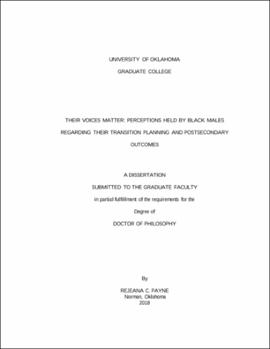| dc.contributor.advisor | Robbins, Rockey | |
| dc.contributor.author | Payne, ReJeana | |
| dc.date.accessioned | 2018-05-11T17:24:22Z | |
| dc.date.available | 2018-05-11T17:24:22Z | |
| dc.date.issued | 2018-05-11 | |
| dc.identifier.uri | https://hdl.handle.net/11244/299902 | |
| dc.description.abstract | This qualitative study examined the perceptions of Black males identified as having a specific learning disability, intellectual disability, or emotional disturbance about their high school transition planning as well as their postsecondary outcomes. The researcher used a phenomenological qualitative approach to obtain in-depth knowledge about the participants. Participants were not afforded secondary transition activities such as student led conferences, transition assessments, self-determination and self-advocacy skill instruction, career planning, or collaboration with outside agencies. Results reveal the omission of effective transition practices and low expectations held by educators can hinder positive postsecondary outcomes. In addition, stigmatizing experiences affiliated with special education services resulted in the participants masking their inner feelings and employing mannerisms associated with cool pose as described by Majors & Billson (1992). | en_US |
| dc.language | en_US | en_US |
| dc.subject | secondary transition | en_US |
| dc.subject | Black males | en_US |
| dc.subject | special education | en_US |
| dc.subject | postsecondary outcomes | en_US |
| dc.title | Their Voices Matter: Perceptions held by Black Males Regarding their Transition Planning and Postsecondary Outcomes | en_US |
| dc.contributor.committeeMember | McConnell, Amber | |
| dc.contributor.committeeMember | Williams-Diehm, Kendra | |
| dc.contributor.committeeMember | Maiden, Jeffrey | |
| dc.contributor.committeeMember | Crowson, Howard | |
| dc.date.manuscript | 2018-04 | |
| dc.thesis.degree | Ph.D. | en_US |
| ou.group | Jeannine Rainbolt College of Education::Department of Educational Psychology | en_US |
| shareok.nativefileaccess | restricted | en_US |
